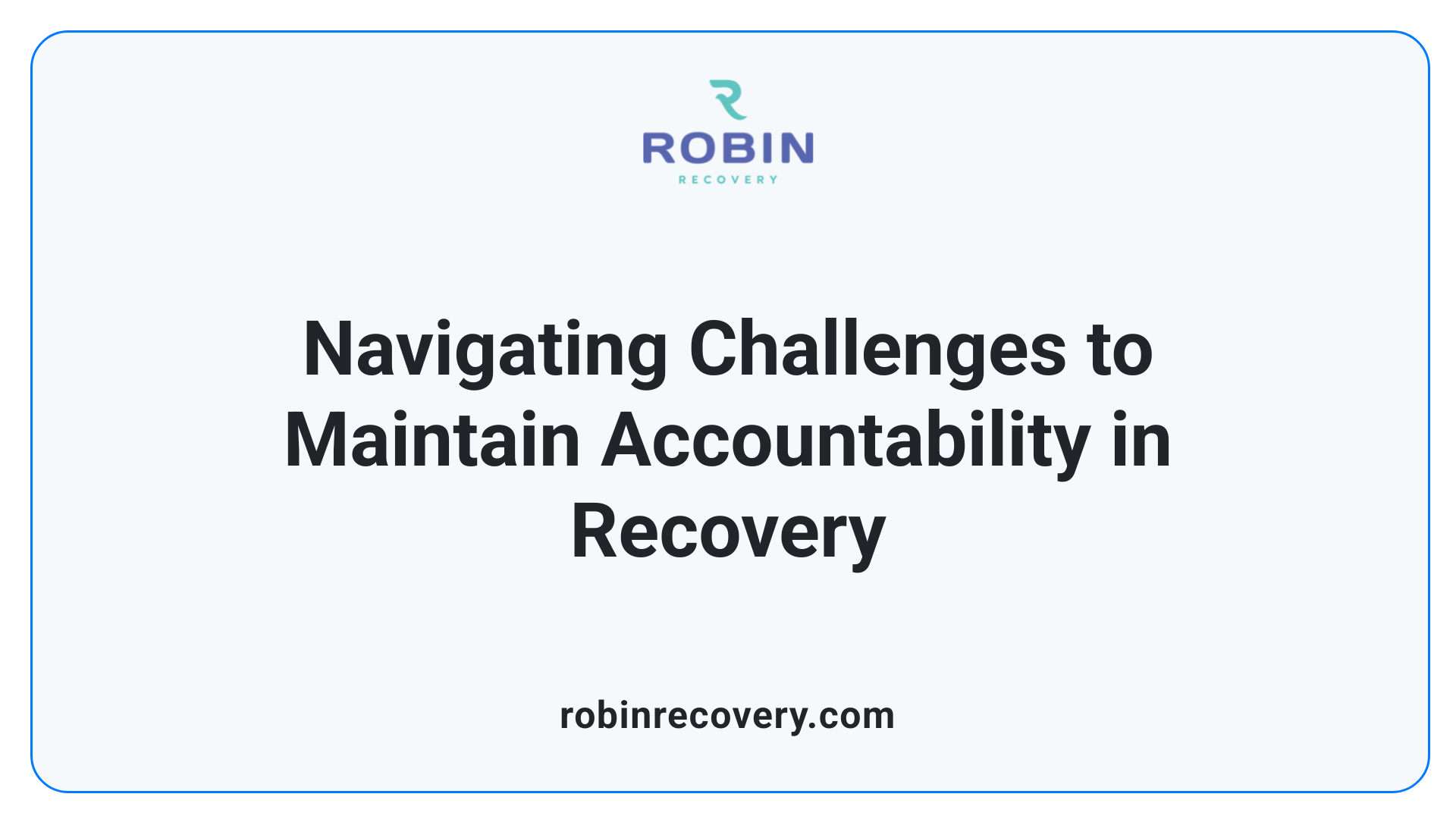The connection between personal accountability and sustained recovery

The Critical Role of Accountability in Addiction Recovery
Understanding the interplay between personal accountability and sustained recovery is essential for anyone navigating the challenging path out of substance addiction. Personal accountability in this context refers to the individual's ability to take responsibility for their actions and decisions, which significantly bolsters long-term sobriety. Through setting boundaries, identifying triggers, and building a supporting network, individuals cultivate the necessary skills to avoid relapse and develop healthier coping mechanisms. This narrative will delve into how personal responsibility shapes the recovery process, the challenges faced in maintaining it, and strategies to enhance accountability.
Embracing Personal Responsibility: The Bedrock of Recovery

What is accepting personal responsibility in recovery?
Accepting personal responsibility in recovery involves acknowledging past mistakes and the harm that substance use has caused to oneself and others. This process is essential for rebuilding relationships and fostering emotional growth.
Recognizing the consequences of one’s actions not only promotes healing but also lays a foundation for a more accountable future. For instance, individuals can enhance their coping mechanisms by actively managing emotions and creating a clean living environment.
Rebuilding relationships
The journey of addiction often strains relationships with family and friends. Adopting personal accountability enables individuals to make amends for past behaviors, which is critical in mending these bonds. By being open and honest about their journey, individuals can foster trust and empathy.
When accountability is prioritized, significant relationships can transform, leading to deeper connections and a supportive network that contributes to the recovery process.
Fostering emotional growth
Embracing responsibility in recovery fosters emotional growth, allowing individuals to learn from their mistakes and engage in self-reflection. This ongoing self-assessment enhances awareness of triggers and personal choices that might lead to relapse.
Moreover, individuals who practice accountability often find themselves more empowered, focusing on positive change. Over time, this reinforces their determination to maintain sobriety and adopt a lifestyle that supports their mental and emotional well-being.
The Profound Influence of Accountability on Recovery
How does personal accountability influence addiction recovery?
Personal accountability plays a pivotal role in addiction recovery by instilling ownership and honesty about one’s actions. This self-awareness is essential for personal growth, allowing individuals to confront the choices they make while navigating their addiction. By embracing accountability, individuals can bridge the divide between the moral and disease models of addiction, adopting a balanced perspective.
Practicing accountability promotes a 'responsibility without blame' mindset, enabling individuals to recognize their agency amid the complexities of addiction. This approach is crucial as it not only reduces the stigma surrounding substance use but also highlights the potential for meaningful change. Many individuals in recovery successfully demonstrate control over their behaviors, signaling a shift toward empowerment.
Support systems significantly augment this process by providing encouragement and understanding. Engaging in groups like Alcoholics Anonymous (AA) or Narcotics Anonymous (NA) allows individuals to share experiences and hold each other accountable. Additionally, pairing up with an accountability partner can help enhance commitment and reduce feelings of isolation, further reinforcing personal responsibility. By helping individuals reflect on their actions and set clear recovery goals, accountability emerges as a cornerstone of effective addiction recovery.
Aspect Influence on Recovery Examples of Application Ownership and Honesty Fosters personal growth Recognizing mistakes Bridging Models Reduces stigma Understanding addiction dynamics Support Systems Enhances commitment Engaging in support groups
Overcoming Challenges in Maintaining Accountability

What challenges do individuals face in maintaining accountability during recovery?
Individuals navigating recovery from substance addiction encounter numerous obstacles in maintaining personal accountability. A significant factor is the history of dishonesty, where past behaviors may include lying or hiding substance use that erodes trust. This pattern can lead to a reluctance to acknowledge current struggles and take responsibility for choices.
Denial and relapse temptation also pose serious challenges. Often, individuals may convince themselves that they can control their cravings or minimize the impact of past behaviors. This denial can prevent them from confronting the reality of their situation and recognizing when they are at risk of relapse.
However, support systems are essential in fostering accountability. Transformative relationships with therapists, peers, or family members can encourage ongoing honesty and open dialogue, which is vital for self-assessment. Support groups, such as Alcoholics Anonymous (AA) or Narcotics Anonymous (NA), provide structured environments where individuals can share experiences and hold one another accountable for their recovery goals.
Incorporating a relapse prevention plan—which includes recognizing triggers and implementing coping strategies—helps individuals remain accountable to themselves and their support networks. By addressing both internal struggles and leveraging external support, individuals can forge a stronger path toward long-term sobriety.
Essential Strategies for Fostering Personal Accountability

What strategies can help foster personal accountability in recovery?
Fostering personal accountability in recovery involves several effective strategies.
- Setting Realistic Goals: Establishing achievable goals is critical for maintaining motivation. Setting smaller, manageable steps allows individuals to celebrate victories along their journey, reinforcing their commitment to sobriety.
- Using Technology and Support Groups: Engaging with technology, such as sobriety apps and alcohol monitoring tools, can provide real-time feedback and facilitate accountability among peers. Additionally, participating in support groups like Alcoholics Anonymous (AA) fosters a strong support network where individuals can share experiences and motivate each other.
- Creating Personal Accountability Statements: Crafting a personal accountability statement helps individuals clarify their commitments. This statement can include recognizing personal triggers and defining proactive measures to handle them, allowing for a more structured approach to recovery.
Strategy Description Benefits Setting Realistic Goals Create achievable steps to maintain motivation and celebrate successes. Increased motivation and focus on recovery. Using Technology and Support Groups Leverage apps and group meetings to enhance peer accountability and support. Real-time feedback and shared experiences. Creating Personal Accountability Statements Articulate commitments and identify personal triggers, aiding in proactive management. Structured approach to addressing recovery challenges.
The Pillars of Accountability within Alcoholics Anonymous

What is the importance of accountability in the AA program?
Accountability plays a fundamental role in the Alcoholics Anonymous (AA) program, as it nurtures a culture of honesty and personal responsibility among its members. At the core of this journey is the admission of powerlessness over alcohol. By acknowledging this struggle, individuals embrace their vulnerability, which opens the door to support from others who share similar experiences.
Engagement in the 12-Step program is crucial. This well-structured framework encourages ongoing reflection about actions and decisions, enhancing accountability not only to oneself but also to the community. For example, members openly discuss their challenges and victories during meetings, fostering shared insights that reinforce commitment to sobriety.
To further facilitate recovery, establishing realistic goals and sticking to a schedule becomes essential. This structured approach helps members maintain a focus on their journey, significantly reducing the risk of relapse. A strong support network enhances this accountability, providing individuals with encouragement and motivation. Ultimately, these elements work in harmony to craft a sustainable recovery path, promoting both personal growth and lasting sobriety.
The Broader Impact of Accountability on Mental Health and Relapse Prevention

Reducing relapse through accountability
Accountability is a vital element in the journey of recovery from substance use disorder. It prevents relapse by instilling a sense of responsibility for one’s actions and choices. When individuals own their decisions, they develop a heightened awareness of potential triggers and dilemmas. This proactive approach encourages them to seek support when faced with challenges, rather than reverting to past behavior.
Enhancing self-esteem and resilience
Taking responsibility fosters personal growth, leading to improved self-esteem. As individuals confront their past and learn from their mistakes, they cultivate a more positive self-image. This resilience is crucial as it enables them to tackle new challenges with confidence. Personal accountability nurtures emotional regulation, contributing positively to long-term recovery efforts.
Building a supportive network
A robust support network is indispensable in recovery. Engaging with individuals who share similar experiences can reinforce accountability. Support groups provide a safe space for accountability partners to hold each other responsible, share progress, and navigate the complexities of recovery.
By fostering connections and promoting honesty, individuals not only bolster their own recovery but also cultivate an environment conducive to others’ growth, creating a synergistic effect that benefits all involved.
A Journey Rooted in Responsibility
The journey to sustained recovery is deeply intertwined with personal accountability. By embracing responsibility, individuals not only navigate the complexities of past actions but also lay the groundwork for a future characterized by sobriety and health. This journey is supported by clear strategies and robust support networks, all reinforcing the idea that recovery is a manageable and achievable goal. Ultimately, personal accountability not only underwrites successful recovery by fostering honesty and integrity but also empowers individuals to reclaim their lives with renewed hope and determination.
References
- Personal Accountability and Long-Term Recovery
- Accountability in Recovery: A Guide to Maintaining Sobriety
- Accountability In Recovery
- The Role of Honesty and Accountability In Addiction Recovery
- Importance of Accountability in Addiction Recovery
- The Power of Accountability in Addiction Recovery Care
- Personal Responsibility & Its Impact on Sobriety & Mental Health
- Connection's Vital Role in Lasting Substance Use Recovery
- Accountability and Responsibility in Addiction Recovery - Evolve Indy
- Accountability in Recovery: What You Should Know - Golden Gate
